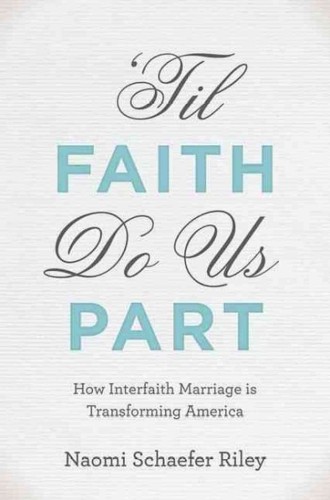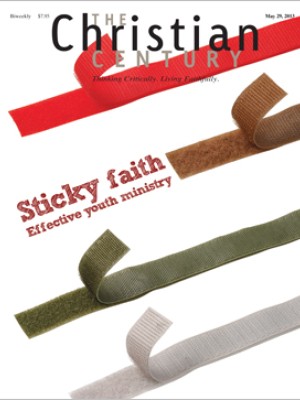Interfaith marriage: A reality check
Some of the most well-attended events held at Duke Chapel when I was chaplain there were on the topic of interfaith dating and marriage. Most of the couples who attended arrived holding on tightly to one another, terrified by the possibility they might hear unpleasant truths. We sometimes used experts who had studied interfaith marriage, but our most successful evenings were those in which we simply drew on the experience of faculty members who were part of interfaith marriages.
I recall two moments from those discussions. One was when our resident rabbi stormed out, complaining, “I’m sick of always coming across as the bad guy while you liberal Christians sit back smiling and saying, ‘Interfaith marriage? No problem. We can bless anything you do as long as you did it for love.’ You guys can be so damned affirming of interfaith marriage because you know that in the end you will get another Jew who is a helluva lot less Jewish.”
Read our latest issue or browse back issues.
The other moment was when a faculty spouse warned the students, “Go ahead and get into an interfaith marriage. But know this: it will be the toughest thing you have ever done. My husband told me at 20, ‘Hey, my family is sorta Jewish, but it doesn’t mean much to me.’ Then I find him at age 30 watching a documentary on the Holocaust: he’s weeping and saying, ‘I want to be a Jew again.’ So now I’m at the synagogue every Friday, Sabbath school—the works. I’m doing the best I can with the kids, but it’s so, so hard.” This was not what the students wanted to hear.
I thought of those truthful, anxious and sometimes hopeful discussions when I read Naomi Schaefer Riley’s well-researched and exceedingly well-written book, which is a great gift to clergy and an even greater challenge to them. It ought to be required reading for anyone who attempts interfaith matrimony, and it’s a crucial resource for anyone seeking to minister to those who contemplate or practice interfaith marriage.
The writer is in an interfaith marriage herself, one that has been happy and fruitful but never easy, she reports. But her book is much more than a memoir. She is a fair-minded, careful and charitable reporter who commissioned the Interfaith Marriage Survey, a nationally representative sample of women and men in and out of interfaith marriages. She also interviewed dozens of couples as well as religious leaders, mainly from Jewish, Christian and Muslim communities.
She reports that there has been a meteoric rise in interfaith marriage in the United States—42 percent of all marriages now are interfaith marriages, compared to just 15 percent in 1988. This is a “bittersweet trend for American religious groups,” she says, since more interfaith contact through marriage tends to increase a person’s appreciation for the other religious group but also weakens ties with the believer’s original religion. While I am unable to judge the methodological validity of her research, her book convinced me that interfaith marriage may be one of the most important stories in American religious life over the past three decades.
Though a higher percentage of Americans (21 percent) say that it is important for a couple to have the same religion than say it is important that they should have the same level of education or the same political affiliation, the growth of interfaith marriage shows no signs of slowing. And though St. Paul warned, “Don’t be yoked with unbelievers” (2 Cor. 6:14), most Christian leaders are more likely to speak of the challenges of marriage than the challenges of interfaith marriage. Riley’s book helped this mainline Protestant see how my own tolerant, charitable, positive attitude toward a member of my own religious family who wants to marry into another faith tradition could be a way of evading the real-life, practical implications of religious differences. We tend to think: Who but a narrow-minded bigot could have reservations about an interfaith marriage?
Riley admires couples who marry outside their faith and who decades later are still committed to their marriage and to their respective faiths. But she delights in frankly examining the challenges. While the public face of interfaith marriage is often that of harmony, Riley assembles evidence and testimony that the reality is otherwise, particularly when children are involved. Interfaith marriage, according to Riley, is no simplistic love story: “My survey suggests that interfaith marriages are generally more unhappy—with lower rates of marital satisfaction—and often more unstable, with particularly high divorce rates when certain religious combinations are involved.” The challenge, she says, is to keep religious life vibrant and marriage strong.
She underscores how the practice of faith is intertwined with issues of food, children, holidays and customs. It is difficult if not impossible to raise children to practice two different faiths. Interfaith marriage is part of the cultural pressure to create a new faith—interfaith. I finished this book with a strong sense that as much as marriage is changing in the United States, marriage is changing our practice of the faith even more.
While Americans want to take a positive view of interfaith marriage, faith often turns out to be a more significant factor than they expected. “Faith is a tricky thing,” says Riley. “It sneaks up on people.” If people grow and develop in their faith, and if a person’s faith commitment is triggered and modified by life events—which we know is true—then the couple that says at age 25, “Differences in religion?—no problem,” may feel differently at 40.
As one young Baptist, now married to a Muslim, said to me, “I didn’t know I was a Christian down deep until I tried living with someone who, though I love her deeply and want to be with her forever, was not a Christian.” Or as the Muslim woman in this marriage said to me, “You Christians sometimes don’t know enough to know how Christian you are until a Muslim shows you.”
Riley implies that interfaith marriage is most problematic for those in faith communities that have adopted the narrative that love conquers all and think that any objections based on religion are misguided—that tolerance should trump everything. Young adults may display decreasing interest in religion, but they continue to have great faith in marriage. And they don’t think their churches and synagogues should have any say in who or how they marry.
The problems of interfaith marriage are a touchy topic. Interfaith couples can be reluctant to talk about the challenges because they fear hearing “I told you so” from family and friends—and because they don’t want to violate the American commitment to tolerance.
Riley found that only 9 percent of mainline Protestants think it very important to marry within their religious tradition. Among Catholics that number is 30 percent; among evangelicals, 40 percent. Jews who were surveyed showed that 39 percent said it was important to their parents that they marry within Judaism, but only 21 percent said that it was important that their children marry a Jew, showing a clear shift in generational attitudes on this subject. Riley says that though viewing marriage through rose-colored glasses is a familiar trait of the young, the rose-colored glasses worn by their elders are “a recent phenomenon in human history.”
Muslims are not permitted to marry outside Abrahamic faiths. Muslim men can marry Jews and Christians; Muslim women can’t. Mormons have the lowest rate of interfaith marriage of any American religious group and the highest rate of disapproval of interfaith marriage. For most Orthodox Christians, “marriage to a non-Christian is simply not possible.” Riley’s narrative of how the Catholic approach to interfaith marriage has changed in practice but not in theory is fascinating.
She examines wedding rites, which for many interfaith couples present the first experience of friction over issues of faith, belief, family culture and child rearing. Little wonder then that 41 percent of interfaith couples elect to have a nonreligious figure officiate at their wedding. (This, she implies, may be another way of denying the challenge ahead for them in their marriage.)
She reviews the saccharine rites found in the book Interfaith Wedding Ceremonies, according to which a couple may pledge to “respect that our ideas and opinions may differ, and to remember that yours hold as much truth and value for you as mine do for me.” Some couples she interviewed adopted the “everything but the kitchen sink” approach to the wedding ceremony, drawing a bit of this and a bit of that from two religious traditions. In one, the broken glass from the Jewish ceremony was said, in the wedding bulletin, to symbolize “the brokenness that I feel sometimes which only your love alone can heal” (at some points Riley is very, very funny).
Her data made me wonder if even the ecumenical courtesy of having a co-officiator from another faith at the wedding ceremony is but another attempt to walk into marriage with rose-colored glasses—to say nothing of an unfair exercise of power by the religious majority over a religious minority. I recall the Jewish-Christian couple who, before they asked me to marry them, had asked a number of rabbis to officiate or co-officiate at their wedding and had been rebuffed. They asked me if I would be willing to put a potted plant in front of the cross so as to hide it during the ceremony. I had the wisdom to respond, “If a potted plant could deal with the differences you bring to this marriage, I would consent. I think those rabbis who turned you down may be more truthful.”







